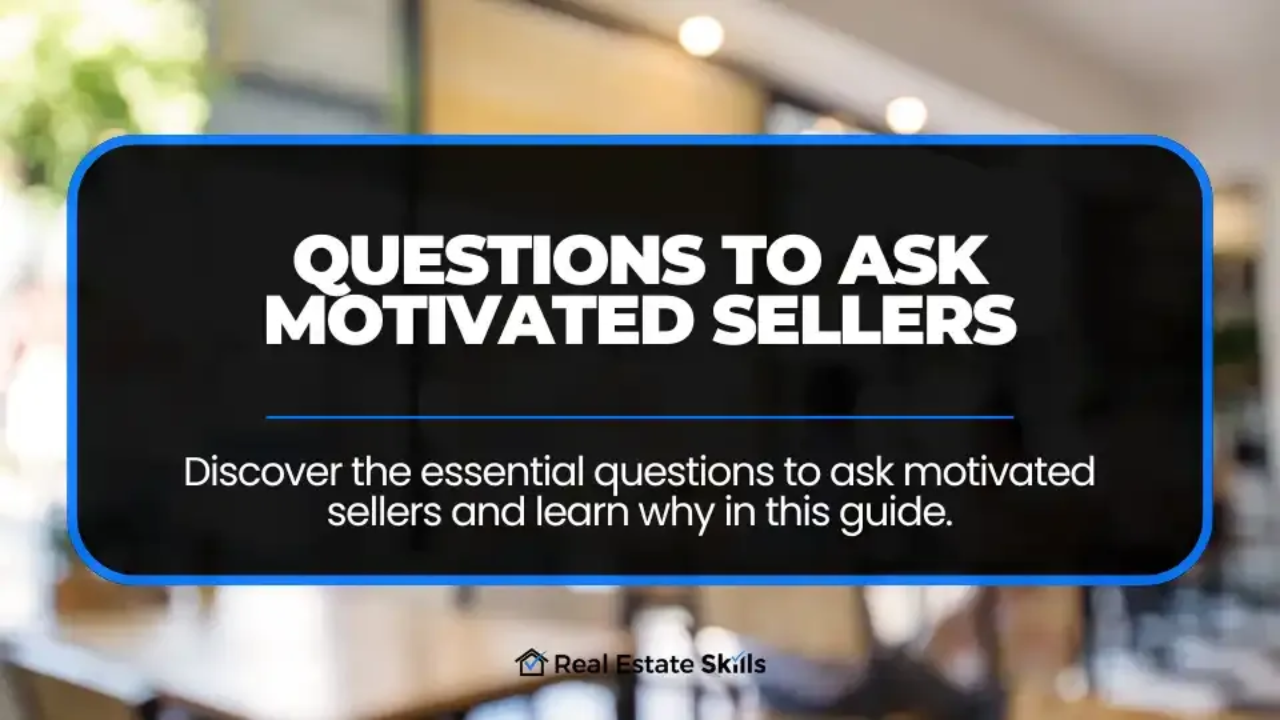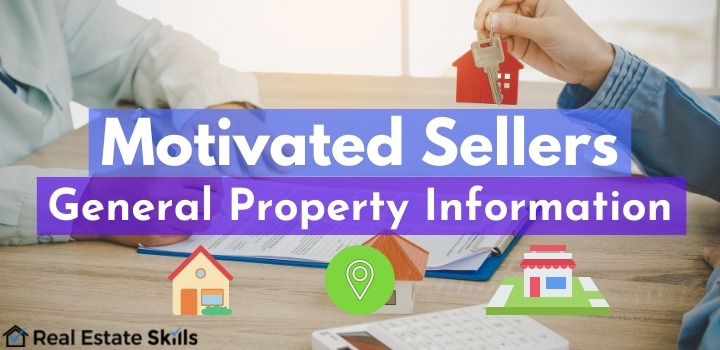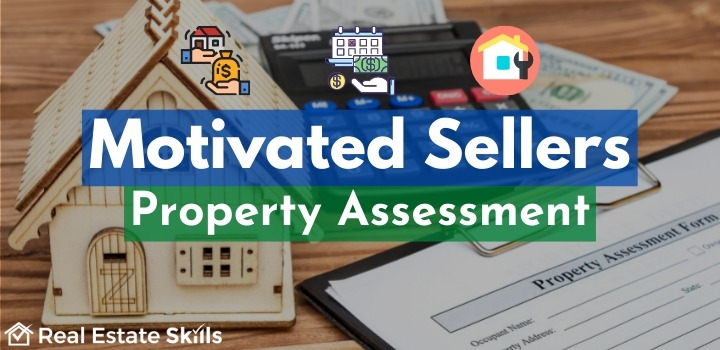
25 Questions To Ask Motivated Sellers: Investor’s (ULTIMATE) Guide
Sep 11, 2025
- What: A prioritized script of questions to ask motivated sellers that confirms identity/decision-maker, motivation, price expectations, timeline, property condition, and liens so you qualify the lead fast.
- Why: The right questions boost appointment rates, protect your spread, and prevent dead-end negotiations by revealing urgency, obstacles, and deal-killing surprises early.
- How: Start with who/ownership and best contact → uncover “why sell” and when → anchor price & lowest cash number → collect property basics (address, beds/baths, sq ft, HOA) and repairs → verify debt/taxes/liens → set next step and appointment.
A motivated seller in real estate is an individual eager or desperately looking to sell their home. The desire to sell may be fuelled by a job opportunity in another state or country altogether, the need to clear a mortgage before foreclosure, or because it’s a distressed property, and they want to get it off their hands.
Whatever their reason may be, it doesn’t always mean their property is fit for your investment. Also, just because they’re motivated to sell doesn’t mean they’ll accept your offer. Asking the right questions is key to ensuring you don’t purchase a property that's too tricky to work with while steering the seller in the right direction.
We compiled a list of 25 questions to ask motivated sellers, starting with tips to help you build rapport with them.
- Speaking To Motivated Sellers
- Questions To Ask Motivated Sellers: Seller's Information
- Questions To Ask Motivated Sellers: General Property Information
- Questions To Ask Motivated Sellers: Property Assessment
- Final Thoug Final Thoughts
If you’re serious about doing your first real estate deal, don’t waste time guessing what works. Our FREE Training walks you through how to consistently find deals, flip houses, and build passive income—without expensive marketing or trial and error.
This FREE Training gives you the same system our students use to start fast and scale smart. Watch it today—so you can stop wondering and start closing.
Speaking To Motivated Sellers
As a people-oriented industry, success in the real estate business is heavily contingent on the relationship you build with the buyers or sellers. Even if they’re motivated, a property owner might decline your offer if you don’t approach them right.
Here are some tips to keep in mind when speaking to a motivated seller:
Ask Open-Ended Questions And Listen
To have a fruitful conversation with a motivated seller, you need to build a connection first. The easiest way to build trust is by asking questions. Start with some basic questions first, such as “How did you find me?” to break the ice, take control of the conversation, and set a precedent for the seller to answer your questions.
With the ice broken, ask open-ended questions such as “What form of payment do you prefer?” Such questions allow the seller to go into detail about why they prefer this over that and so on. That’s a big plus since it will enable you to understand their bottom line and collect more details about them that may come in handy during the sale.
But don’t just ask questions. Actively listen to their responses to lessen their vulnerability and motivate them to answer more of your questions or continue the conversation.
Don’t Sound Scripted
Want to pique a motivated seller’s interest? It doesn’t sound too scripted. Suppose a potential property seller feels like you’re reading through a seller script, you’ll come off as sales-driven, and they’ll immediately consider this cold calling and lose all interest. To avoid sounding scripted, research more about the lead before you call them and use bits of information you learned about them during the call.
For instance, use their actual name instead of “sir" or "madam” and other professional tags to build trust. Also, speak slowly but confidently, pause between thoughts, and try to convey passion, so you come off as natural, friendly, and professional instead of sounding scripted.
Interview Posture
Try to maintain an interview posture when speaking to a motivated seller face-to-face. It conveys confidence, comfort, and relaxation while simultaneously maintaining professionalism. So, the next time you talk to motivated seller leads, sit up straight and look at them directly. Alternatively, you may adopt their posture to make them more relaxed for the conversation.
Always Be Assessing Motivation
Although it’s essential to focus on what the motivated seller wants, remember the deal will affect you too, and they may not even sell it to you. So while listening to their needs, use your questions wisely to evaluate just how motivated they are to sell.
For instance, ask, “How soon are you hoping to close?” If they say something like “I’m not sure” or “It depends on so and so,” they may not be ready to sell right away and might require further nudging. If they say they’re willing to sell soon, and why they might need only a little convincing to close. So, find out the why behind their decision to sell, and use it to guide the conversation.
Questions To Ask Motivated Sellers: Seller's Information

To set the pace for a smooth conversation, start by gathering the seller’s information. Learning more about the individual helps build rapport and gauge which approach to use for the rest of the conversation. Here are some questions to help you gather a seller’s information:
1. Who am I speaking with? Are you the decision-maker?
A person’s name is their identity, and addressing them connects to their individuality, creating a sense of recognition and consideration. That is why you must find out a motivated seller's name before anything else.
Once they introduce themselves, inquire whether they’re the decision-maker to avoid having a full-fledged conversation about the property, only to find out the individual you’ve been talking to for hours has to talk it over with someone else before they can sell.
Asking who’s calling the shots prevents time-wastage since you can determine whether to continue the conversation or wait until the final decision-maker is available.
2. What is the best way to contact you?
Most real estate deals often close between the 5th and 12th contact with the lead. Even motivated sellers take time to make up their minds, meaning you’ll need to follow up. Ask this question to get their best or most accessible phone number or contact information for an easy time during follow-up.
3. How did you hear about me?
Depending on the answer, this question helps you determine the source of your leads and whether your marketing efforts, such as direct mail, are working out. Since real estate investing is a competitive industry full of other investors like you, asking a motivated seller how they heard about you offers insight into what made you stand out to them.
You can tailor your marketing strategies to attract more similar leads with this information.
4. Are you the only owner of the property?
If the person you’re speaking to has a sole ownership interest in the property, they’re free to do whatever they want, including selling it. But if there’s a joint ownership interest, every decision related to the property must be made unanimously, which may take time. That is why you need to ask a motivated seller whether they are the only owner of the property.
5. Why are you looking to sell your home?
Some motivated sellers are usually looking to sell because of a need, while others do so simply because they want to. Motivated seller who leads with a need are often more open-minded and willing to consider your first offer because the need drives them. But those who simply want to sell won’t settle for a low price because they have no urgency.
Asking this question helps you determine urgency and the kind of offer to roll out.
6. What asking price did you have in mind?
Most first-time property sellers are often unfamiliar with the real estate market and will overvalue their property just to see how much you’re willing to offer. Knowing how much they have in mind before you state your offer helps you determine whether what you’re ready to offer is too low or too high.
A seller’s asking price also lets you gauge whether the offer is worth negotiating or not. For instance, if their asking price is way too high compared to your offer, it might be challenging to convince them to take it, in which case, it’d be best to walk away. But if it’s slightly higher than your offer, you stand a chance to convince them to accept a lower amount.
7. What did you base your asking price on?
Some property owners may base their asking price on other properties sold in their neighborhood and real estate comps they got from a realtor friend. Knowing how a seller came up with their figure lets you determine whether they’d be open to taking your offer.
If their asking price is based on factors like sentimental value, it’d be an opportunity to enlighten them on how property is valued and even influence their final asking price.
Some sellers may even base their asking price on special property features that could help bump up overall investment value. You’d never find out about such features if you didn’t ask this question.
8. How soon were you wanting to have it sold and closed?
Some sellers might be over-motivated and ready to sell like yesterday, while others might still be unsure and want to take their time. The sooner they want to sell, the more likely they will accept your offer and vice versa.
However, beware of motivated sellers who want the deal done too soon because you won’t get enough time to learn about the property.
9. What would be the least you would be willing to take on a cash offer to buy as-is?
Want a motivated seller to reduce their asking price without you negotiating too much? Ask them this question. Most sellers will often state a figure lower than they initially asked, creating more room for negotiations. Also, asking this question helps you determine how flexible and motivated a seller is about selling the property.
10. Have you consulted with a Realtor, or are you talking to other investors?
If the seller was already consulting with another realtor or other real estate investors, they might already have another offer but aren’t satisfied yet, and are consulting you to weigh their options. As a result, you may have to increase your offer if you think their property has high profitability potential.
So ask whether they’re speaking to another real estate agent, and if yes, inquire about the previous offer, when it expires, and why they’re yet to accept it.
Questions To Ask Motivated Sellers: General Property Information

Here are some general questions to ask a motivated seller regarding their property:
11. What is the address of the house you want to sell?
Just because you know the location doesn’t mean their property lives up to the standards of that exact neighborhood. The location might be affluent, but the property a motivated seller is telling you about is in the worst part of that neighborhood, lowering its overall value. So make sure you find out the address earlier on, so you can start doing your homework about it even before you give them your offer.
And suppose you’re unfamiliar with the location; knowing the address gives you a chance to ask around or even check it out before your official appointment with the seller, so it’s easier to get there when you officially have to.
12. What is the property type?
Investment properties range from single-family homes, condos, and townhouses to apartments. You must find out the exact type of property a seller is offering you from the start since it’ll directly impact your investment goals, cash flow, borrowing capacity, and even how much cash you can put down upfront.
13. How many bedrooms and bathrooms does it have?
Most single-family homes have three bedrooms and two bathrooms, but some have up to five bedrooms and four bathrooms. Similarly, standard condo units often feature 2-3 bedrooms, but you may come across some with four.
Units with additional bedrooms and bathrooms often have a higher market value than traditional ones. So be sure to ask the seller about the total number of bedrooms and bathrooms, as it’ll give you an idea of the average property value to expect when you invest.
They must give you a straight and accurate answer. When you finally list the property, an attic or garage converted into a bedroom won’t be considered a bedroom since these spaces are often not counted as usable square footage.
14. How many square feet is the home?
A property’s square footage will directly influence its resale value, repair costs, and overall buying costs. So, ensure you inquire about it before you commit to a property that’ll cost you more for repairs than the profit it’ll bring in, or one that just won’t sell because it’s too small.
15. Is the home one or two stories?
Some buyers prefer one-story homes because they’re easy to maintain, while others prefer two-story homes because they offer square footage. This difference in preferences only means that whether a property is single or double-storied will affect buyer availability once you purchase it. Hence, you need to ensure you ask this question.
Also, just as with the property type, the number of floors directly impacts the overall cost of the property.
16. Is the property in an HOA?
If the property is under an HOA, you’ll be limited in the modifications you can perform on it. HOA bylaws might also affect the selling process since some HOAs expect a buyer to own and hold the property for a particular amount of time before selling it or converting it to rental property.
But it’s not all negative, though. Buying an investment property with an HOA means it might come attached to amenities such as swimming pools and tennis courts that help increase its overall real estate market value. So, find out whether the property is part of an HOA, and if so, how does that affect its investment value.
17. What year was the home built?
The age of a property has a direct impact on its market value. New or recently built homes tend to sell faster and at higher, better prices than old or outdated homes. This is because newer homes often include trending designs and up-to-date features, making them more appealing to buyers. Ask when a house was built to avoid investing in an old home, as you may have to make costly updates just to get it to sell.
18. Does it have a garage, basement, or pool?
Although a home’s garage, basement, or pool isn’t considered usable space, it often adds to the property’s overall value. Properties with these features are appraised for more than those without. For instance, a finished garage can add more than $5,000 to the resale value of a home, while a finished basement offers up to 75% returns on investment (ROI).
Even without adding to the resale value, homes with such features are often more appealing to buyers than those without, meaning reduced listing times, which is good for you as an investor.
Questions To Ask Motivated Sellers: Property Assessment

Now that you know more about the seller and have general information regarding the property, it’s time to start asking hard and serious questions. These include:
19. How much is owed on the house?
Most motivated sellers who owe money on their property will often inform you, especially if this debt is the motivation behind the sale. However, not every seller is the same, and some might wait until closing before they let you know, for fear that if they tell you earlier on, you’ll back away.
So, ensure you ask this question if a seller has yet to mention anything about mortgages, tax liens, or debts. This is essential since some debts, for instance, tax liens, can significantly slow down the deed transfer process. In the case of a mortgage, they may not have built enough equity, which also affects the closing process.
20. What are your monthly payments on the house?
Knowing a property’s monthly payments offers you an idea of the costs you might have to incur when you acquire its ownership.
21. Is the house behind on payments?
The seller’s mortgage status is the easiest way to evaluate their financial situation and urgency. It also offers you an idea of how long closing might take and the closing costs to anticipate. For instance, if a motivated seller is behind on several mortgage payments and has little to no equity, the deed transfer might take a while because the lender is involved.
If their mortgage is delinquent, you need to find out if there’s an impending foreclosure, which also presents another obstacle in real estate investing. However, some sellers might find this question offensive, so be thoughtful about how you ask it.
22. Have you completed any recent repairs or upgrades?
If the seller has recently completed upgrades or repairs, they might use this as leverage to ask for a higher offer. Inquire about this during the vetting process, and find out the total cost to evaluate how much they might try to ask for as their asking price, since it affects profitability, especially in investments like wholesaling.
23. When can I come by to take a look at the house?
If a seller is highly motivated to sell, maybe because they’re moving, they might even ask you to stop by the next day because they want to close and move on. If you reschedule for a future date, they might take that negatively and move on to other investors. Ask how soon you can stop by, and if the dates don’t work for you, agree and schedule an appointment on dates that work best for both parties.
24. Do you have any properties that I should know about?
Current sellers are often the best source for investment property referrals, as they might have come across other for-sale-by-owner (FSBO) individuals while trying to market their property. They might even have other properties they plan on selling in the future. Don’t miss other lucrative investment opportunities by failing to ask the above question.
25. What repairs and/or updates would you say I would need if you were going to list with a Realtor?
Repair and upgrade costs typically add to the total value of the sale when done by the property owner. However, if they’re yet to do any repairs or upgrades, the resulting costs will fall on you as the investor. In that light, make sure you directly inquire from the seller about the required repairs and upgrades before assuming ownership.
Final Thoughts
Finding motivated sellers in the highly competitive real estate investing industry is a hassle. Unfortunately, that’s not all you have to do. You also need to nurture them through the sales pipeline through sales phone calls and other follow-up methods to get them to sell.
If you’ve finally managed to get a motivated seller on a call, you must maximize this opportunity and guide them towards closing by asking the right questions. To give you a head start, we’ve compiled 25 of the most important questions to keep in mind while speaking to a motivated seller above.
If you’re serious about doing your first real estate deal, don’t waste time guessing what works. Our FREE Training walks you through how to consistently find deals, flip houses, and build passive income—without expensive marketing or trial and error.
This FREE Training gives you the same system our students use to start fast and scale smart. Watch it today—so you can stop wondering and start closing.
*Disclosure: Real Estate Skills is not a law firm, and the information contained here does not constitute legal advice. You should consult with an attorney before making any legal conclusions. The information presented here is educational in nature. All investments involve risks, and the past performance of an investment, industry, sector, and/or market does not guarantee future returns or results. Investors are responsible for any investment decision they make. Such decisions should be based on an evaluation of their financial situation, investment objectives, risk tolerance, and liquidity needs.







